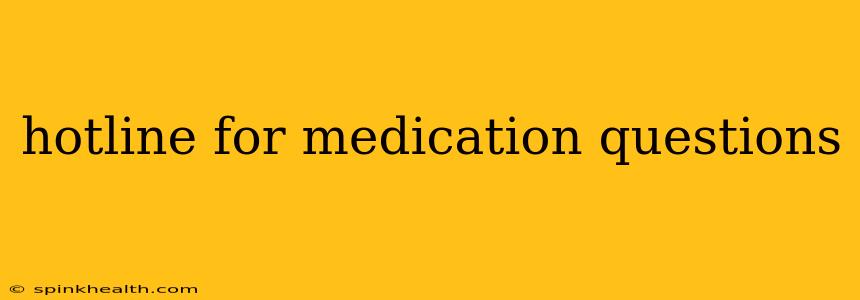Navigating the world of medications can be confusing, even for seasoned veterans. From understanding dosages to managing side effects, having reliable resources at your fingertips is crucial. This guide explores various avenues for getting your medication questions answered, demystifying the process and empowering you to take control of your health.
What is the best hotline for medication questions?
There isn't one single "best" hotline for all medication questions. The ideal resource depends on your specific needs and the nature of your inquiry. For general information and to address less urgent concerns, websites like the FDA's MedWatch program (which we'll discuss below) or your doctor's office are excellent starting points. However, for immediate concerns about a potential adverse reaction or overdose, calling emergency services (911 in the US) is always the best course of action.
What is the number for the poison control center?
In the case of a suspected poisoning or medication overdose, the Poison Control Center is your lifeline. Their number is 1-800-222-1222 (in the United States). This number connects you to experts who can provide immediate guidance and potentially life-saving instructions. Remember, this is for emergencies involving accidental ingestion or overdose; it's not a general medication inquiry line.
Is there a hotline for medication side effects?
While there isn't a dedicated hotline solely for medication side effects, several resources can help. Your doctor or pharmacist are your primary contacts for discussing any concerns you have about potential side effects. Reporting side effects through the FDA's MedWatch program is also critical to helping improve medication safety for everyone. MedWatch provides a system for reporting adverse events to the FDA, which helps track potential issues with medications. You can report online or by phone, but it’s important to note that this isn't a real-time, question-and-answer service; it’s primarily for reporting potential side effects or problems after they've occurred.
Where can I get help with understanding my medication?
Understanding your medications is fundamental to responsible self-care. Your pharmacist is an invaluable resource. They can explain how to take your medication correctly, explain potential side effects, and answer your questions about interactions with other medications or foods. Don't hesitate to schedule a consultation with your pharmacist; they're there to help you navigate the complexities of your prescriptions. Many pharmacies also offer educational materials and resources to help patients better understand their medication regimens.
What about medication interactions?
Medication interactions can be complex, and it's crucial to be aware of any potential conflicts between different medications you might be taking. Again, your doctor and pharmacist are your best resources here. They can review your complete medication list, including over-the-counter drugs, supplements, and herbal remedies, to identify potential interactions and adjust your plan accordingly. Never assume that medications are safe to combine without consulting a healthcare professional.
The Importance of Proactive Communication
This journey through understanding your medications highlights the importance of communication. Don't hesitate to ask questions; your healthcare providers are there to support you. Remember that open and honest communication is key to managing your health effectively and safely. By proactively engaging with your healthcare team and utilizing the resources available, you can navigate the world of medications with confidence.

